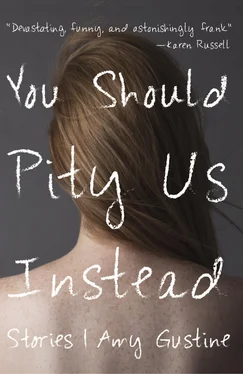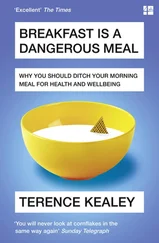Joanne wakes with the worst earache she’s had in years. Ryan is already gone and the baby is crying, of course. His diaper has come loose — she put it on in the dark, at three a.m. — and he sits in a yellow halo clutching his favorite toy, a stuffed elephant now marinated in piss. When she plucks the elephant from his grip, the scream intensifies.
“Jesus,” she says, flicking the toy back at him. “Fine, take the fucking thing.”
It hits him in the forehead and he stares a moment, startled, then grabs it like a life preserver as Joanne takes up the tears, kissing his head again and again. “I’m sorry. I’m sorry. I didn’t mean to hit you with it. I’m sorry.”
Dumbo sloshing in the Whirlpool, she gives the baby a quick bath, which only makes him scream louder. By the time she has a bottle ready he’s too apoplectic to notice until she squirts a long line of milk straight down his throat.
Fine, take the fucking thing. While he drinks, Joanne repeats the words to herself as if they’re a line she’s trying to memorize instead of a confession she’s trying to bear. She imagines cutting out her larynx, making all her mistakes in sign language. But then she’d have to cut off her hands.
Once the baby’s done eating, she begins her penance, walking him in circles through the house until the ache in her back and arms is almost as bad as the one in her ear. When she was a kid the doctors wanted to do surgery, but her father dismissed it as profit-mongering. As an adult, Joanne had the surgery and for a time things seemed better. Now though, her Eustachian tube feels like someone used a tire pump on it. She’d like to turn off the air conditioning — cold makes it worse — but then the baby’s thighs will sprout a rash and any chance of quiet will be destroyed. Not that there’s much chance anyway. At eight months old, he hasn’t had a single good day. The doctors claim he’s perfectly healthy, that the crying is only a symptom of infancy, and Joanne knows they think she exaggerates, that he doesn’t really wail twelve hours a day. Ryan probably thinks so too, but he can’t prove it. Between starting a landscaping business and going to school, he’s rarely home.
Minutes before the washer’s spin rumbles to silence, the baby falls asleep. He’ll definitely wake if she puts him down. Then again, he might also wake at the click of the dryer door closing. Regardless, she’ll need that goddamn elephant, so Joanne takes her chances with the door.
A shudder, then the wail commences. She stabs the dryer’s buttons and resumes walking.
The earaches began in early grade school and grew progressively worse until, one day in the summer of 1993, Joanne’s eardrums burst. She remembers the summer well because that May, just before school let out, her father left her mother for a woman named Pamela and by June he was talking about moving to Florida. When Joanne’s mother, Lou, wasn’t railing about this—“He can’t fucking commit to a state, let alone a marriage”—she worked at Redmond Financial during the day and went to school at night to become an accountant.
Joanne, twelve at the time, spent her days off school with her friend Tina, who lived down the block. Tina and her little sister Megan were alone all day too, their mother at her job as a checkout clerk, their father only a name they heard occasionally when their mother made a phone call late at night asking for money.
The girls’ day began at ten o’clock, usually with spoonfuls of peanut butter and a bag of potato chips, then TV, lunch, and more TV. Sometimes Tina, who was long-legged and fidgety like an acrobat, convinced Joanne to play tennis in the street, but more often they spent the open hours after their soap opera ended sitting on the hill, waiting for Caid to appear. The hill was two streets over from their block, a small rise on an empty lot from which they could see Caid’s driveway and the basketball hoop mounted above his garage door. Caid was older by three years and neither girl had a prayer of dating him. Knowing this, they were able to love him wholeheartedly, without a sense of competition. In fact, they each loved him more because they could share it.
But one day Joanne couldn’t sleep until ten because of the pain in her ear. At seven a.m. it forced her out of bed and she snuck four aspirin from the medicine cabinet, grinding them with the end of her toothbrush before carrying the white powder into the kitchen and slipping it into her cereal bowl. Lou sat at the kitchen table drinking coffee and staring into space. If she found out about the earache, she’d accuse Joanne of kissing boys or not washing her hands often enough. Lou had a thing about germs.
That morning, when Joanne swallowed the first spoonful of cereal, a spike of pain surprised her and she coughed, spewing aspirin-speckled cocoa puffs across her T-shirt. Lou snapped from her reverie, her loud voice suddenly dulled and echoed, and shook her head. Jesus, Joanne, you could fuck up a one-car funeral.
Thinking of this, Joanne realizes she hasn’t taken any medicine yet, so she fetches the elephant from the dryer, puts the baby in the swing and goes upstairs to get the ibuprofen off her nightstand. At the sight of her bed, she considers closing the door and putting a pillow over her ear, then pictures the swing, its shaky Chinese base, its white and red triangular sticker that reads, “Warning! Do Not Leave Child Unattended,” and goes back downstairs.
The swing has found its soothing rhythm, though the baby’s face is still red with rage and his cry has begun its raspy phase, which sometimes means he’ll take a break, sometimes not.
Huddled beneath a blanket with her ear pressed against the sofa’s blocky arm, Joanne feels the entire city reduced to the size of this room. She imagines the wail expressed in water, a tsunami of grief bearing down, down, down.
Twenty minutes and no break. Joanne transfers all hope to an egg, scrambled hurriedly. The baby throws it on the floor the same way he has orange sections, steamed carrots, and every other solid she’s tried. Apparently chewing offends him. The pediatrician scolded her: “It’s the mother’s job to get children on table food.”
“I’m trying,” she argued, “but he hates everything. Everything.”
Before the baby, Joanne worked in a lab, her beakers always clean, her experiments always consistent. In college, she made straight A’s and never missed a class. In those days she believed that, unlike her parents, she’d look back on her choices and see a straight line rising steadily to the right at a forty-five-degree angle. As if life were like a smorgasbord: all you had to do was pick the vegetables.
Joanne takes the baby outside, to the relief of warm air, and holds him above her head, gently shaking—“What? What is so damned horrible?”—until the flap of a neighbor’s upstairs blind sends her back into the air conditioning, where she roots through her CDs for a soothing voice, something like what she listened to that summer she was twelve, when she had Whitney Houston’s “I Will Always Love You” on tape. She and Tina liked to sing along, using a banana or a hairbrush as a microphone and watching themselves in the big mirror that hung above the sofa in Joanne’s living room. One time the windows were open and Caid rode by on his bike and the girls threw themselves to the floor, mortified and thrilled that they might have been seen, that he might have guessed they were singing about him.
The morning her eardrum burst, after Lou had left for work, Joanne put Whitney in their ancient walnut console with the lattice-covered speakers and turned the volume up to ten. Alone, she didn’t sing, only listened, revolving slowly, arms spread wide, marveling at the absence of pain. As she turned, the music changed, swelling and receding. It never occurred to Joanne she’d gone temporarily deaf on the left, that the price to be paid for relief was silence.
Читать дальше












